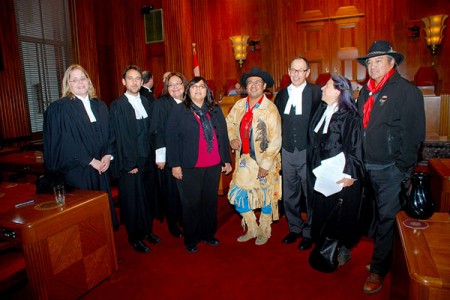Landmark ruling in Canada on First Nation land claims

Chief Roger William (the representive plaintiff, centre), standing next to Chief Judy Wilson (Secwepemc) and Chief Wayne Christian (Secwepemc) and the Tsilhqot’in Legal team (David Rosenberg, Jay Nelson) and the Secwepemc, Okanagan, UBCIC legal team (Louise Mandell, Ardith Walkem and Prof. Nicole Schabus – far left in the picture. Photo: Thompson Rivers University, Creative Commons, some rights reserved
A really big case was decided by Canada’s Supreme Court on Thursday. How big? Well, most news coverage is using words like “historic precedent”, “landmark” and “game changer”. First Nation leaders are ecstatic about what feels like simple justice from the courts – at last.
The court case involved the Tsilhqot’in Nation in British Columbia (pronounced Sil-Ko-tin). While very new, and rendered on the specifics of this claim, this latest interpretation of the legal rights could ripple across Canada, and beyond.
Here’s how the Globe and Mail put it:
The Supreme Court of Canada has put aboriginals on a new footing in a landmark ruling that has huge implications for natural-resource industries across the country. Aboriginal communities gain important new economic assets, and powerful leverage over development by outsiders, but not a veto.
In what legal observers called the most important Supreme Court ruling on aboriginal rights in Canadian history – a culmination of all previous rulings – the court determined that native Canadians still own their ancestral lands, unless they signed away their ownership in treaties with government.
The failure of governments to fully honor treaties is a long, bitter reality in Canada and the U.S. But this case is slightly different, because it concerns the rights of those who never signed treaties or ceded their claims in the first place, but lost control anyway.
As reported by the Canadian Press:
“British Columbia is comprised of unceded, unextinguished aboriginal-title territory from one end to the other,” said Stewart Phillip, grand chief of the Union of B.C. Indian Chiefs.
Phillip admitted he was not expecting the decision but he called it a win for all Canadians.
“Now we have the opportunity, we have the platform to build a genuine dialogue of reconciliation that has eluded us for so long,” he said.
“I truly believe that a rising tide carries all boats and in that regard, we have an opportunity to participate in the economic future of this province as equal partners.”
The ruling falls short of giving total control over traditional land to First Nations groups in British Columbia. It does gives real substance to making First Nations part of land use decisions, with enormous consequences for things like resource extraction and pipelines. All of which impact ordinary life, as expressed by this from the CP article:
Chief Joe Alphonse, tribal chairman of Tsilhqot’in National Government, saw in the ruling the possibility of ending the crushing poverty of his people.
“Today, we can barely afford to have houses for our people,” he said.
“We can barely afford to give our elders enough fuel money to go to Williams Lake to go see a doctor. A former tribal chief used to call our reserve a glorified concentration camp. I sure as hell hope we broke down some of those barriers today.”
It’s too early to say just how things will be different there, and how this could affect other land claims. But it’s clear that this decision will have enormous impact.
Tags: canada, environment, First Nation land claims, history, indigenous rights, justice, land use, law, politics






.png)
